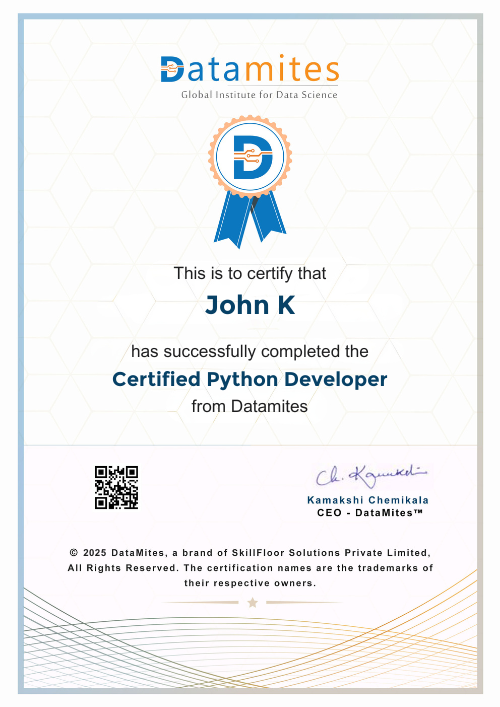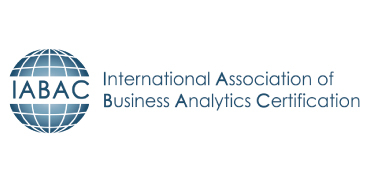Instructor Led Live Online
Self Learning + Live Mentoring
Customize Your Training

• Introduction of python
• Installation of Python and IDE
• Python Variables
• Python basic data types
• Number & Booleans, strings
• Arithmetic Operators
• Comparison Operators
• Assignment Operators
• IF Conditional statement
• IF-ELSE
• NESTED IF
• Python Loops basics
• WHILE Statement
• FOR statements
• BREAK and CONTINUE statements
• Basic data structure in python
• Basics of List
• List: Object, methods
• Tuple: Object, methods
• Sets: Object, methods
• Dictionary: Object, methods
• Functions basics
• Function Parameter passing
• Lambda functions
• Map, reduce, filter functions
• Decorators
• Generators
• Context Managers
• Metaclasses
• Inheritance and Polymorphism
• Encapsulation and Abstraction
• Class methods and static methods
• Special (magic/dunder) methods
• Property decorators - getters, setters, and deletes
• Working with files
• Reading and writing files
• Buffered read and write
• Other file methods
• Logging & Debugger
• Modules and import statements
• SQL Basics
• Creating DB Table
• INSERT, READ, UPDATE, DELETE
• Introduction to MongoDB
• CRUD operations in MongoDB
• namedtuple(), deque, ChainMap,
• Counter, OrderedDict, defaultdict,
• UserDict, UserList, UserString
• Exceptions handling with try-except
• Custom exception handling
• List of general use exception
• Best practice exception handling
• Generators, Iterators
• The Functions any and all
• With Statement
• Data Compression
• A Daytime Server
• Clients and Servers
• The Client and Server Programs
• Classes and Threads
• Multi-threading; thread life cycle
• Regular Expression Syntax
• Group, Split and wildcards
• Quantifiers
• Match, Search and Find all methods
• Character Sequence
• Introduction to OpenCV, Installation
• Basic Operations on Images
• Image Filtering
• Image Classification
• Introduction to GIT
• Basic Git commands
• Introduction to Flask and Installation
• Creating project
• Routing,templates, forms and database integration
• Deployment on render
• Django Introduction and Installation
• Creating a Project
• Django Architecture and File Structure
• Folder Structure, First Django project
• Database and Views, Static Files and Forms
• URL Mapping and Routing
• Defining Models and Relationships
• Database Migrations and Schema Changes
• Querying Data using Django ORM
• Model Forms and Form Validation
• HTML Forms in Django
• Model Forms and Form Validation
• Formsets and Inline Formsets
• File Uploads and Validation
• Deploying Django Applications
• Hosting Options (e.g., Heroku, AWS)
• Project Showcasing and Review
Python is a high-level, interpreted programming language known for its simplicity and readability, widely used for web development, data analysis, artificial intelligence, and more.
Installing Python involves downloading the installer from the official Python website, running it, and following the installation prompts.
Comparing Python and Java in terms of superiority is subjective and depends on the specific use case and requirements.
Python 2 and Python 3 differ in syntax and functionality, with Python 3 being the latest version and considered the present and future of the language.
Recommended resources for beginners learning Python include online tutorials, interactive coding platforms like Codecademy or Coursera, and books such as "Automate the Boring Stuff with Python" by Al Sweigart.
Python is utilized in data science for tasks such as data manipulation, visualization, machine learning, and statistical analysis using libraries like NumPy, pandas, Matplotlib, and scikit-learn.
Python frameworks are collections of modules and libraries that provide pre-written code to simplify the development of applications, such as web frameworks like Django and Flask.
Effective methods for debugging Python code include using print statements, utilizing Python's built-in debugger (pdb), and employing IDEs with debugging tools like PyCharm or Visual Studio Code.
Python and R differ in their approach to data analysis, with Python being a general-purpose programming language favoured for its versatility, while R is designed specifically for statistical analysis and has a larger ecosystem of statistical packages.
To become a certified Python developer, one can pursue certification programs offered by organizations like the Python Institute or demonstrate proficiency through projects, contributions to open-source, and practical experience.
Craft an impressive resume by highlighting Python skills, relevant projects, and any certifications or experience in related technologies.
Prepare for Python developer interviews by practising coding challenges, reviewing algorithms, and demonstrating problem-solving abilities.
While a formal degree can be beneficial, it's not essential for pursuing a career in Python development; relevant skills and experience often weigh more heavily.
The primary duties of a Python developer include writing efficient, maintainable code, collaborating with teams, and developing software solutions using Python frameworks.
Transition into a Python developer position by acquiring Python skills, building a portfolio of projects, networking with professionals in the field, and showcasing transferable skills.
Python offers benefits in e-commerce by enabling rapid development, scalability, integration with data analysis tools, and support for web development frameworks.
Educational credentials sought after for Python positions in Denmark typically include a bachelor's or master's degree in computer science or a related field, along with relevant certifications or training.
Initiate a Python development career in Denmark by attending coding bootcamps, pursuing online courses, participating in coding communities, and seeking internships or entry-level positions.
Certifications significant for Python developers in Denmark may include those from organizations like Python Institute or vendor-specific certifications from companies like Microsoft or Google.
Employment prospects for Python developers in Denmark are generally favourable, with growing demand in industries like IT, finance, e-commerce, and tech startups.
The salary of a Python developer in Denmark ranges from DKK 96,534 per year according to an Indeed report.
In Denmark, DataMites serves as a beacon for Python enthusiasts, offering customized curricula, seasoned mentors, and adaptable teaching approaches. Whether individuals are starting fresh or aiming for skill enhancement, DataMites provides practical projects and dedicated career support, guiding them forward in their Python quest.
Embarking on Python training with DataMites in Denmark ensures immersion in a meticulously crafted program tailored to mastering this versatile programming language. With a focus on hands-on learning, participants acquire relevant skills crucial for thriving in the industry.
The Python Developer Course in Denmark spans four months, encompassing 20 hours of live online sessions and 400 hours of self-paced learning.
Python Developer Training in Denmark with DataMites welcomes individuals from diverse educational backgrounds, including graduates, postgraduates, and high school alumni. The program caters to beginners, laying a solid foundation in Python fundamentals.
DataMites introduces the Flexi-Pass for Python training in Denmark, offering participants a three-month window to access training sessions. This flexibility accommodates queries, revisiting materials, and attending extra sessions to meet individual learning objectives.
The DataMites Certified Python Developer Course in Denmark provides comprehensive training covering basic to advanced Python concepts, equipping learners with proficient skills.
The Python for Data Science Course tailored by DataMites in Denmark caters to individuals with varying levels of programming proficiency. It covers fundamental topics such as data manipulation, machine learning algorithms, and essential programming techniques vital for proficient data analysis.
DataMites' Data Mining with Python Course in Denmark concentrates on the extraction of insights from extensive datasets to drive predictive analytics, a crucial aspect of Data Science. It equips learners with a diverse skill set essential for effective data analysis.
The Python for Machine Learning Course by DataMites introduces participants to a variety of machine learning algorithms and their practical application using Python, with a particular emphasis on leveraging the capabilities of the Scikit-Learn package.
The Python for Deep Learning Course offered by DataMites delves into the principles of deep learning using Python and the Keras library. It explores both theoretical foundations and practical applications across domains such as computer vision and natural language processing.
Indeed, DataMites integrates internship opportunities into their Python courses in Denmark, allowing learners to acquire practical experience and apply Python skills in professional settings, thereby augmenting their employability.
Upon successfully concluding Python classes in Denmark with DataMites, participants are awarded the esteemed IABAC® certification, a globally recognized credential validating proficiency in Python programming.
To attend Python training sessions in Denmark with DataMites, participants are required to present valid photo identification, such as a National ID card or driver's license.
Certainly, DataMites incorporates project opportunities into Python training in Denmark, comprising 10 capstone projects and 1 client project, enabling learners to apply Python skills in authentic scenarios.
In the event of missed Python training in Denmark, participants can access recorded sessions and course materials online through DataMites' platform. Additionally, makeup sessions can be arranged to ensure continuous learning progression.
Tools covered in Python developer training by DataMites in Denmark encompass Anaconda, Python, PyCharm, Flask, NumPy, Pandas, and Google Colab.
Interested individuals can avail themselves of a complimentary trial class to experience the training firsthand and comprehend its structure.
Career mentoring sessions, conducted by the DataMites Placement Assistance Team (PAT), offer guidance on Data Science career prospects, address challenges, and provide strategies for corporate success.
DataMites offers Python training in Denmark with fees ranging from DKK 1,091 to DKK 2,976.
Certainly, DataMites provides help sessions aimed at improving comprehension of specific Python topics, ensuring participants effectively grasp the concepts.
The DataMites Placement Assistance Team(PAT) facilitates the aspirants in taking all the necessary steps in starting their career in Data Science. Some of the services provided by PAT are: -
The DataMites Placement Assistance Team(PAT) conducts sessions on career mentoring for the aspirants with a view of helping them realize the purpose they have to serve when they step into the corporate world. The students are guided by industry experts about the various possibilities in the Data Science career, this will help the aspirants to draw a clear picture of the career options available. Also, they will be made knowledgeable about the various obstacles they are likely to face as a fresher in the field, and how they can tackle.
No, PAT does not promise a job, but it helps the aspirants to build the required potential needed in landing a career. The aspirants can capitalize on the acquired skills, in the long run, to a successful career in Data Science.



